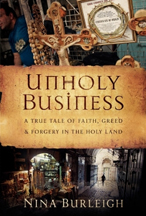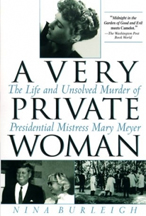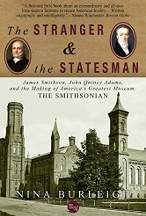The daughter of beatnik parents, McFate grew up on a decommissioned World War II barge and now lives in a wellappointed Washington, D.C., apartment where she and her U.S. Army vet husband recently played host to the Swedish defense attaché. Yet at 41, Montgomery McFate apparently still can't resist the lure of transgression. Though coy about it, she's said to be the brains behind the blog I Luv a Man in Uniform, where Pentagon Diva feverishly debates the relative hotness of various Department of Defense wonks. But whether her colleagues at the DOD, or anyone else, really believe she is Pentagon Diva is of little concern to her. She has much more important work to do.For the past five years, McFate, a Yale- and Harvard-educated cultural anthropologist, has been on a self-described evangelical mission to help the U.S. government better understand the cultures of Iraq and Afghanistan. McFate wants to make sure that American "war fighters"--Pentagon-speak for the troops--are equipped with the kind ofknowledge that field anthropologists gather, say, about the isolated tribes of Papua New Guinea and share with one another in books and lectures. "A lot of people think this information is out there," she says. "That's not true." At the simplest level, there's this oft-cited example: American guards at checkpoints should know that Iraqis regard a hand held up with palm facing out as a sign to approach, not to stop. And then there's the big picture: that the United States' plan to dismantle every aspect of Saddam Hussein's government relied on the assumption that a stable bureaucracy had been in place to begin with--a fatal mistake, McFate believes. "If we had known more about Iraq then, we'd have realized that the whole country had already been ripped apart under Saddam Hussein," she says. "That kind of misunderstanding should never happen again."
Taking Flak At Home
McFate wasn't always this clear about her "mission" in life, but she'd long been fascinated by the notion of making social science relevant to the military. "I was interested in the idea of an intellectual connection between these two different worlds--anthropologists and armies," she says, noting that Margaret Mead, among others, had worked on government projects during World War II. "Anthropologists even use the same language as intelligence services--words such as local knowledge and informant." In 2003 McFate began exploring these connections during a fellowship at the Office of Naval Research, and her work there led to a study for the office of the secretary of defense; she spent 18 months interviewing hundreds of soldiers returning from Iraq and Afghanistan about cultural miscues and dangerous miscommunications.
"For example, Iraqi Shias fly black flags, which have symbolic religious meaning," McFate says. "Some marines told me that, early in the war, they attacked unnecessarily because they misinterpreted this as a sort of opposite of surrender--a sign that read 'Shoot here!'
"If the military is trying to rebuild a country, fight an insurgency and establish civil order, common sense dictates that they ought to know as much as possible about the environment--physical and social--in which they are operating," she says. Not only did McFate identify gaps in the military's cultural knowledge, but she proposed filling them by sending teams of social scientists into the field to act as military staff advisers. In a Department of Defense scrambling to resolve the growing crisis in Iraq, her idea caught on fast; the initiative is now a $20 million project, awkwardly named the Human Terrain System. As senior adviser, McFate vets the ground teams. Her ideal hire, she says, has a PhD in Middle Eastern studies, is fluent in Arabic and also happens to have trained with the Navy SEALs. And, yes, she has found a few.
McFate's work has won her accolades (including a Distinguished Public Service Award from the navy) and the support of some very prominent members of the military establishment. "She is the person I would hold responsible for getting the Department of Defense to really talk about why it is and was important to understand the culture in a place like Iraq," says retired navy commander Lilia Ramirez, a program director at the Department of Homeland Security and one of McFate's mentors at the ONR. "And she has really connected well with the marines and soldiers."
Many fellow anthropologists, however, are less enthusiastic about McFate's work, troubled by the idea of linking humanistic scholars to the national security apparatus. They fear that her
efforts will undermine American anthropologists' safety and credibility overseas.
"The Pentagon hopes that anthropology can be to the war on terror what physics was to the Cold War. If that happens, our discipline will never be the same," says Hugh Gusterson, a professor of anthropology at George Mason University. "I have no issue with anthropologists doing a one-day briefing with U.S. troops before they leave for Iraq," he adds. But projects such as McFate's are "using culture to grease the skids for occupation.
"The bottom line is that the needs of anthropology and the needs of military action are radically at odds," reads one angry post on the blog Savage Minds: Notes and Queries in Anthropology. "McFate is arguing for an enlightened tyrrany [sic], but a tyranny nonetheless."
Anarchy On The Bay
Strains of opera and the aroma of an increasingly fragrant lamb stew waft in from the kitchen, where McFate's husband, Sean, 38, is cooking. The apartment is filled with nineteenth-century Asian art. Two pampered Siamese cats, Tosca and Lakme, slink around behind Japanese screens and pad over the Oriental rugs in the living room. Smoking American Spirits one after another--"They don't have the weird chemicals the others have"--McFate reminisces about her offbeat childhood: "In the world I lived in, there was no bedtime, no dinner or breakfast. No one helped you get to school on time, because your parents were out all night or waking up in bed with someone new. I spent a lot of time trying to get out of my house."
The only child of Frances Poynter and Martin Carlough, Mitzy, as she was known, grew up on a disused military barge moored in San Francisco Bay that her mother divided into three loftlike dwellings, two of which were rented out. Money was scarce, as were order and predictability. Poynter practiced sidereal astrology (the kind that's "actually useful for predicting things," McFate insists), hung out with beat legends Lawrence Ferlinghetti and Neal Cassady, and sold fake Polynesian wooden statues to Trader Vic's for a living.
Mitzy did her homework in the relative peace of a bus stop bench, prompting cops at one point to suspect that the solitary little girl with the long light-brown hair was a child prostitute. A beloved grandmother ("the only stable person in my life when I was growing up," she says) lived with them on the barge for a time, but she died when McFate was eight. Her father, who had served in the Marine Corps during the Korean War, was mentally ill and spent most of the years she knew him unemployed and living in a shack made of tinfoil. He committed suicide when she was 10.
By her teens, Mitzy was finding kindred spirits in the early 1980s punk scene. "I was a very good student in high school," she says. "I took it very seriously. I would go out all night, sleep on the street for about two hours, then wake up and take the bus to school still wearing my pink vinyl outfit." Mitzy attended the same grade school as Grace Slick's daughter and made a lifelong friend of the novelist and social critic Cintra Wilson. She and Cintra slam-danced the night away; Wilson would later model a character on McFate in her novel Colors Insulting to Nature. In the book a girl named Lorna serves as the commonsense-talking ballast for the main character--in a relationship that closely resembled the real-life one the two friends had when they were growing up. Wilson says she's not surprised to find her old pal working for the DOD.
"Very early on in her girlhood, she developed Teen Beat-style crushes on the movers and shakers at the center of exclusive, hermetic and usually male-dominated subcultures--punk rock, for example, and its charismatic leaders," Wilson says. "Her intellectual crushes turned toward more complex and exclusive social orders: the Ivy League, the military. At heart, she was always a fan. She really adores tough people with big brains, burning ambitions. . . . She brilliantly found a way to make this her profession."
The punk scene lost its appeal when some of Mitzy's friends began doing hard drugs, sometimes with fatal results. "After all of those people died, I was like, whoa, this has to end, I can't be involved in this anymore," McFate says.
After working her way through two years of community college, she was accepted at the University of California, Berkeley. "We should try to have a really nice summer," her mother told her after casting her own astrological chart that spring. "I think I'm going to die at the end of it.
And she did, on McFate's first day at Berkeley. "She had a massive coronary," McFate states flatly. She finished the semester, then took a year off to sell the barge and settle her mother's affairs. Back at Berkeley as a scholarship student, McFate had little use for students "living there and taking acid on their parents' money," she says. She gravitated toward multidisciplinary study and took a few anthropology classes, including on on the rhetoric of terrorism.
"I became interested in how people justify violence," she says. "When you ask how that can possibly make sense to them, you are forced to think subjectively." During graduate school at Yale, she spent nine months in Belfast studying Irish Republican culture for her dissertation on the British counterinsurgency in Northern Ireland. Not wanting to teach, but not quite sure what she should do instead--"I just followed my intellectual interests," McFate says--she entered Harvard Law School, then almost immediately regretted her decision. "I thought, what am I doing here?These people are so straight; they're all about money," she recalls, adding that she just couldn't find a "tribe" with whom she could fit in. Her attempts to forge friendships with Harvard's "human rights crowd" were similarly unrewarding. "They are so concerned about the suffering of the third world, they can't even drink a martini," McFate says with a laugh.
But she did stay, and she met her husband there. His tribe was definitely not her own. Sean, a blue blood from Connecticut and New York, was serving as a paratrooper with the Eighty-second Airborne and eventually attended Harvard's Kennedy School of Government. A mutual friend introduced them; the two e-mailed for several months, then finally met for dinner in Cambridge on Valentine's Day 1997. "I put down my fork and said, 'We are going to get married,'" McFate recalls. "And he put down his fork and said, 'OK, when?'" They wed 10 months later.
Sean McFate is stocky, darkhaired and square-jawed. Like Montgomery, he embodies opposing spirits: A gourmet cook and an opera fanatic with his own music blog, he was most recently employed by the defense contractor DynCorp International to help demobilize Liberia's army and train a new one. The McFates are odd birds to find in or near the U.S. military: They are both now, and always have been, opposed to the invasion of Iraq, and they make no secret of their disgust at the blunders of the current administration. (Montgomery does, however, applaud the efforts of General David Petraeus, commander of the U.S. military forces in Iraq: "He is doing now what should have been done in the first place," she says. "The first rule of fighting counterinsurgency is, you provide security for the civilian population.")
At one point during our interview, Sean interrupts from the kitchen: "Sweetie, I'm worried about a side dish for the lamb." Montgomery has no suggestions, and soon the meal plan is forgotten with the consumption of two bottles of red wine. We head out to a nearby Lebanese restaurant.
When the maître d' explains that he can't accommodate the two regulars because a film crew will be recording a party the journalist Helen Thomas is hosting, Sean argues with every member of the staff who crosses his line of sight. Between his glowering and Montgomery's measured cajoling, we are soon seated and end our evening together, surrealistically, as extras in documentarian Rory Kennedy's latest project.
A New World Order
Knowledge, according to McFate, always escapes the bounds of its creator. "So if you are sitting in the tactical operations center advising the commander, you have a much better chance of guiding how the information is used," she says. The problem, however, is that anthropology is "highly ideological," proclaims McFate as she lights up another cigarette, dismissing her critics as hidebound academics with a strongly entrenched bias against the government. "For me, part of becoming a professional meant rethinking all of the assumptions that I had been handed as a graduate student."
So the woman who once thought the Cold War was a vast government lie now espouses conservative notions about the left-wing leanings of American academia. But McFate doesn't share the other part of that worldview, which is that the 1960s are the root of all that is evil in the United States, and perhaps the world, today.
"I think the 1960s were great!" she exclaims. "I think they opened up people's perceptions, challenged the established order and created new space, and that was all tremendously good for the United States. I was always searching for order and rationality in my own life, but at the same time I took a lot from my beatnik mom and also from punk rock, which is that you have to challenge the established authority. And if the established authority is your hippie parents, then you challenge them and find something that's not about peace, love and understanding."
As More went to press, McFate was preparing for her first trip to Iraq and Afghanistan, where she would assess the progress of the initial wave of Human Terrain teams. Now that she's become part of Washington culture, and at a moment when the U.S. government seems the most troubled it has been in decades, McFate feels oddly in sync with the world. "When things are breaking down, you know, it's not always bad," she muses over another glass of Italian red. "You can find opportunities." After more than 40 years of searching, Montgomery McFate appears to have found her tribe










Very useful info. Hope to see more posts soon!
----------------------------------------
http://www.hotdvdmarket.com/